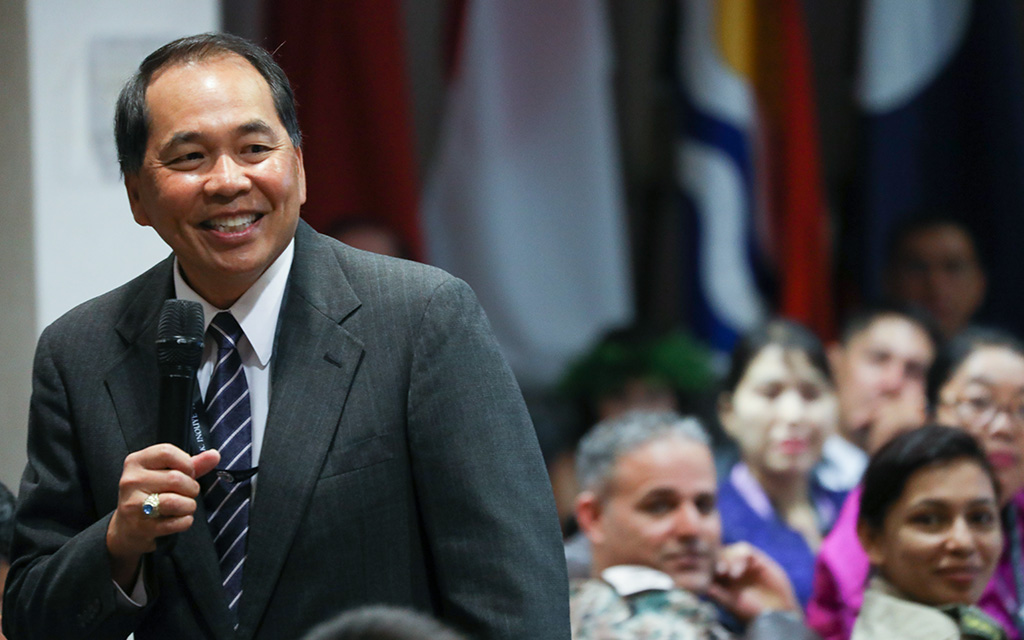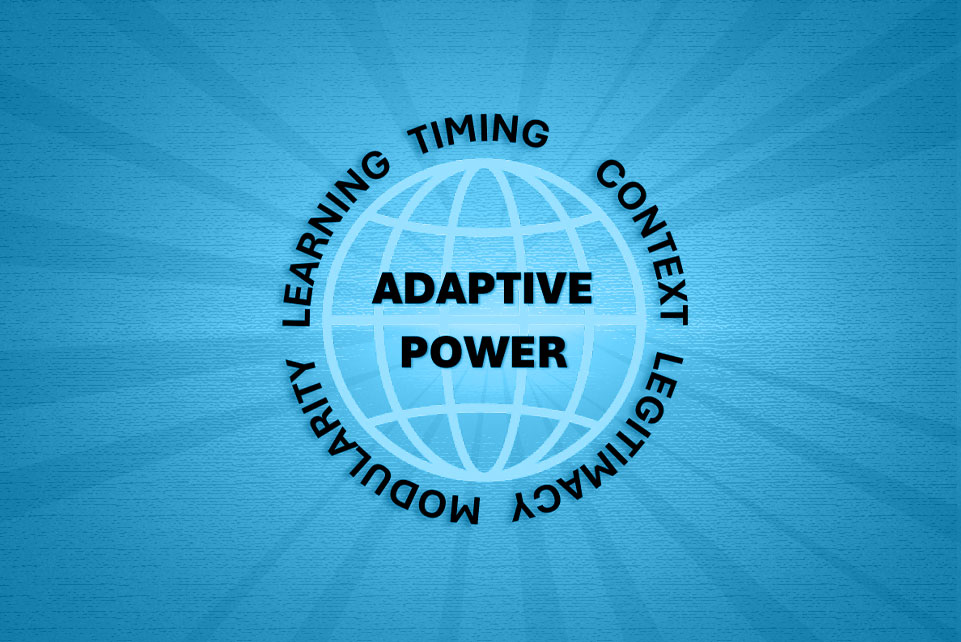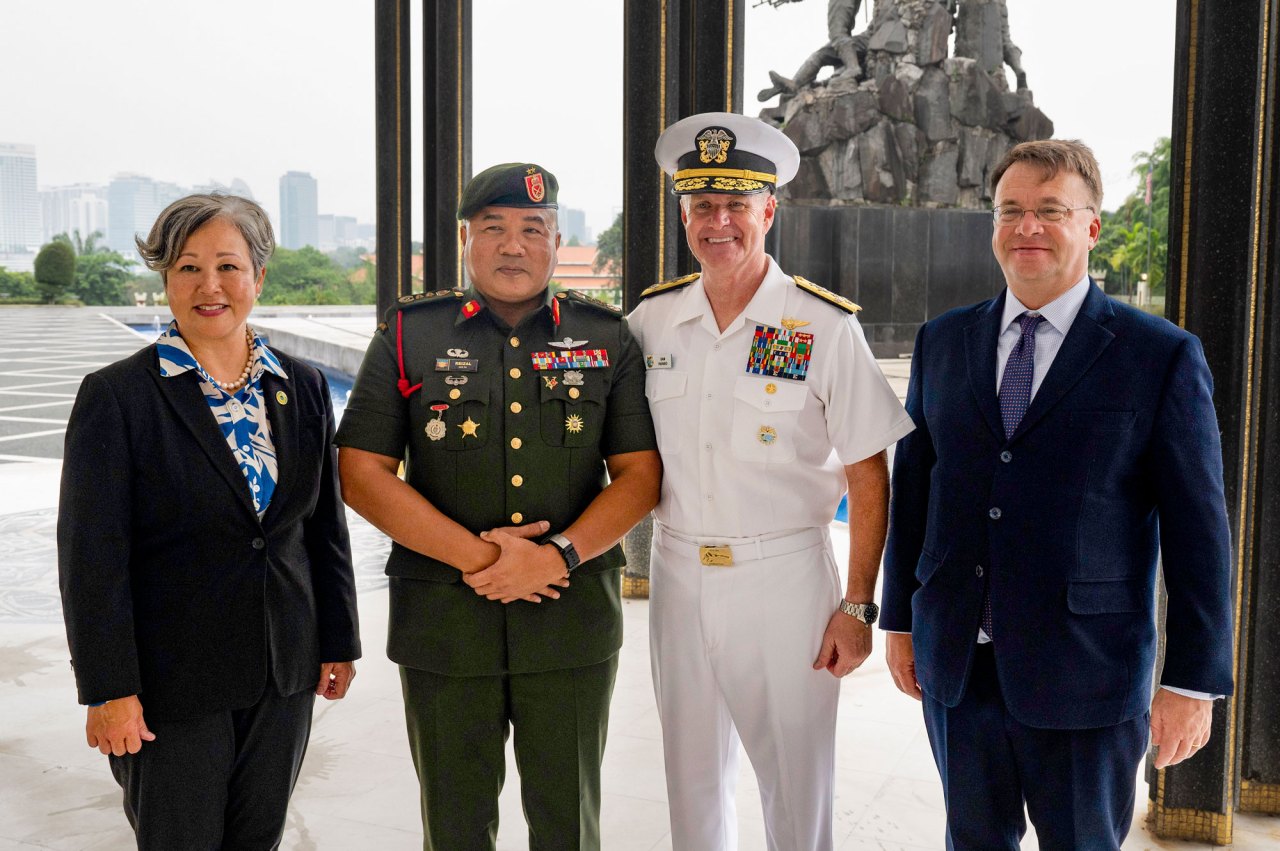Aloha and Hafa Adai!
We’ve accomplished so much this year even up to the last weeks of December and now it’s time to give pause in our busy schedule to recharge our batteries, reflect on our awesome accomplishments this past year, and to reset our focus towards 2019 and beyond which is turning out to be as ambitious and exciting as this past year.
We couldn’t have done all of this work without every part of our Ohana coming to the Center ready to work and contribute every day to our ongoing success. Without the individual contributions from our Ohana, we would not have maintained 100% program execution despite varying challenges. So let me first highlight what you have all done to carry the relevance of our Center throughout 2018. Mind you, it is not all inclusive of all the activities and events executed by DKI APCSS this year, however, it illustrates clearly how much has been done and accomplished in such a short period.
2018 Activities
In 2018, we educated, empowered, and connected 1,552 security practitioners from over 50 countries worldwide through eight alumni-producing courses and 11 workshops, conferences, roundtables, and security dialogues. We do all of this across several lines of effort:
Courses
- Comprehensive Crisis Management (CCM) 18-1. Feb. 15 – Mar. 14, 2018; graduated 102 Fellows/37 locations
- Advanced Security Cooperation (ASC) 18-1. Mar. 28 – May 2, 2018 ; 106 Fellows/37 locations
- Transnational Security Cooperation (TSC) 18-1. May 20 – 25, 2018; 25 Fellows/24 locations
- Asia-Pacific Orientation Course (APOC) 18-2. June 18 – 22, 2018; 163 Fellows/12 locations
- Comprehensive Security Responses to Terrorism (CSRT) 18-1. Jul. 12 – Aug. 8, 2018; 108 Fellows/45 locations
- ASC 18-2. Sept. 20 – Oct. 24; 107 Fellows/34 locations
- TSC 18-2. Nov. 4 – 9; 27 Fellows/24 locations
- APOC 18-3. Dec. 3 – 7; 160 Fellows/13 locations
Workshops
- ASEAN Plus Expert Working Group/Humanitarian Assistance Disaster Relief, Jan. 31 – Feb. 2, 2018
- Countering Violent Extremism #2, Philippines, Mar. 13 – 16, 2018.
- S. Strategy in the Indo-Pacific, April 4 – 6, 2018
- Maritime Shared Awareness #4, Thailand, May 14 – 17, 2018.
- Vietnam 2025, Sept. 5-7, 2018.
- Confidence Building Measures Regarding North Korea, Sept. 28, 2018.
- Advancing a Free and Open Indo-Pacific, Oct. 25-26, 2018.
- Integrating Private, Civil, Public in Disaster Response, Taiwan, Dec. 11 – 14, 2018.
Engagements
- Near East South Asia Nepal Workshop, Jan. 31 – Feb 1, 2018.
- George C. Marshall Center Lecturing, Feb. 19 – 23, 2018
- North Korea Diplomacy Initiative at US Institute of Peace, Feb. 26, 2018.
- Institute for Defense Studies India, Mar. 3-9, 2018.
- Special Operations Command Pacific (SOCPAC) Cooperation Against Transnational Threats, Philippines, Apr. 16 – 26, 2018.
- LANPAC (Land Forces in Asia-Pacific), May 22
- Rim of the Pacific International Maritime Security Exposition, Aug. 1–3, 2018.
- SOCPAC PACOM Security Cooperation Working Group India, Aug. 27 – 31. 2018.
- Chiefs of Defense (CHOD) Conference, Sept. 10 – 12, 2018
- CHODS Spouses Visit, Sept. 11, 2018.
- Maritime Security Challenges Conference , Canada, Oct. 16 – 18, 2018.
- Capability Defense Working Group, Oct. 29 – Nov. 2, 2018
- PACFLT CDR’s Spouse Visit, Nov. 5, 2018.
- USPACFLT International Senior Enlisted Training Symposium, Nov. 13 – 15, 2018.
- Bangladesh Institute for Maritime Research and Development (BIMRAD) Maritime Security and Good Governance in the Indian Ocean Region, Nov. 19, 2018.
- East West Center Maritime Conference with focus on Indonesia future Challenges and Opportunities, Nov. 30, 2018.
- Gulf of Thailand Initiative Commanders’ Forum, Thailand, Dec. 11-14, 2018.
Faculty/Subject-Matter Expert (SME) Collaborations. Our faculty are some of the most talented academics in government service. They routinely published a wide range of editorials, academic papers, and analytical reports on various regional and national level topics and receive numerous invites to perform as guest speakers. Some of their significant contributions outside of the Center include:
- Counterterrorism/Countering Violent Extremism (CT/CVE) SME’s: We supported Near East South Asia Center for Strategic Studies (NESA) and SOCPAC for events in Manila, Philippines; the George C. Marshall Center for European Center for Security Studies (GCMC) in Garmisch, Germany; and the Naval War College in Rhode Island.
- Disaster Management SME’s: We supported a NESA event on Disaster Response Capacity in Kathmandu, Nepal that that was attended by the Nepal Chief of Army.
Alumni Program. In 2018, we held 90 alumni engagements during our courses, workshops, visits, and alumni-centric events, with 833 alumni engaged.
Visit Program. In 2018, we hosted 293 official visits welcoming 1,940 visitors. The Visit Program is an important and valuable learning opportunity that highlights the DKI APCSS mission in region and allows for collaboration with other organizations to share their insights on Indo-Pacific security.
- Significant visitors include 1x Chief, of Defense (CHOD), 3x US Senators, 6x foreign parliamentary-level visits, 8x ambassadors, and 13x congressional staff delegations along with over 135x US and international General Officers/Flag Officers/SES officials.
Fellows/Cohort Projects. Fellows’ Projects remain a significant mechanism for measuring our impact in the region. Some are harder to quantify and can be viewed as subjective but that doesn’t make them any less valuable:
- A Fellow from Pakistan spearheaded the development of Pakistan’s National Countering Extremism Policy Guideline Strategy.
- A Fellow from the Philippines created a 5-day training program on Preventing and Countering Violent Extremism for government officials of all levels and education institutions around the country.
- A Malaysian Fellow established a regional center for military legal studies and international humanitarian law.
- A cohort from Niue is currently working on a handbook that lays out the roles and responsibilities of government agencies, NGOs, and the private sector for proper coordination in managing crises.
- Three cohorts from Vietnam, Papua New Guinea and ASEAN, have been working on projects geared towards Trafficking in Persons with results that currently include greater public awareness and several lives saved.
- Bali Process Cohort started a project on “Combatting and Addressing Maritime Migration in South and South East Asia.” The project is an effort to build an information and intelligence-sharing platform to assist Bali Process member nations to increase interdiction of migrant vessels.
2019 Focus
One of my main focus of effort for 2019 is to “invest first towards the betterment of our Center and People” as we continue to look outward supporting our key stakeholders to include Security Practitioners abroad. It’s a simple approach that I borrow from the financial paradigm of “paying yourself first” but in a larger context of professional development and growth of my people so we can continue to foster a culture of trust, teamwork, ownership and pride. To this effect, I remain steadfastly committed to my team in always looking for ways to improve and help charter a course to ensure we maintain our relevance and value to the Security environment for years to come. Of particular importance to me is the professional development of our staff and faculty to include new arrivals in 2019 and beyond. We will continue to share with you how our Center is “unique” in helping build a cohesive network of Security Practitioners focused in sharing and collaborating to better understand this complex security environment to get to practical outcomes for a more stable and prosperous region. As we look toward 2019, the year promises to be dynamic as we create a more innovative Center that publishes a Center Strategy in conjunction with an Implementation Plan, introduces a Maritime Security Cooperation Course, and expands our use of Matrix gaming in other courses to name a few of what’s new.
- Center Strategy. The Center is taking a refresh look at our overall strategy that serves as the foundation upon which engagements/activities (what) and established processes (how) nest to maintain our relevancy for the next 10 to 15 years through our unique approach of educating, connecting, and empowering security practitioners. As Dr. Al Oehlers highlighted in the recent On-Site, the development of this Strategic Roadmap is just the first step of a continuous process of developing a plan, executing the plan, assessing our actions through critical measures of effectiveness and performance and then adjusting our strategy downstream to ensure we are continually heading in the right direction of maintaining the credibility and value we have earned today with many of our stakeholders.
- FY19 Program. As you all know, the 21st Century security environment is defined by complexity, ambiguity, interconnectedness and speed of change. We must always seek to adapt if we are to maintain our relevance as a Center. We have a solid and robust FY 19 program but we need to ensure that we maintain reserve capacity in our Center in order to effectively react to emergent tasking from our leadership as a result of this dynamic environment that we live in. In order to do that and keep our eye toward future innovation and change, we had to make some tough decisions to cancel course and workshops in order to create some white spaces. That being said, we did add a new Maritime Security Cooperation (MARSEC) course. This course is designed to strengthen the capability of maritime security policy advisors and practitioners to support efforts to promote a free and open Indo-Pacific region and protect the rules-based international order. We are also working on ways to better innovate and adapt our already successful program into one even better and more responsive to the needs of our Security Practitioners. Everything is a journey so any changes in what we do will be approached pragmatically and rigorously. Here’s a broad-brush of significant events we have planned for 2019 (does not include planned Dialogues, Partnerships, and SME Collaboration):
- CCM 19-1, Feb. 7 – Mar. 13, 2019.
- China’s Global Reach: A Security Assessment workshop with our sister Regional Centers, Jan. 30 – Feb. 1, 2019.
- ADMM + on HADR, Mar. 8-22, 2019.
- Pacific Islands National Security Policy workshop, Mar. 26-28, 2019.
- Europe Asia CT: Securing Borders, May 14-16, 2019.
- Maritime Shared Awareness V Workshop (TBC)
- TSC 19-1, May 19-24, 2019.
- CSRT 19-1, Jun. 6 -Jul. 3, 2019.
- APOC 19-1, Jul. 15-19, 2019.
- MSC 19-1, Aug 1-28, 2019.
- Alumni Association Workshop, Sept. 10-12, 2019
- ASC 19-2, Sept. 30 – Oct. 23, 2019.
- Speaker Series. The inaugural launch of The Daniel K Inouye Speaker Series is tentatively scheduled for February 6, 2019. The series will contribute to Senator Inouye’s vision of Hawaii’s role in ensuring a secure, stable and prosperous region. Our co-hosts in this series are the Daniel K. Inouye Institute (DKII) https://dkii.org and the Foundation for the Asia-Pacific Center for Security Studies (APCSS Foundation), in cooperation with the East West Center and the Pacific Forum International (formerly Pacific Forum-CSIS). Comprising the planned 175 attendees will be community leaders from the private sector, State/local government, as well as academe administrators, teachers and students.
- Center upgrades. We also have a number of IT and facility upgrades planned during the new fiscal year. Our IT team is working hard on server and system upgrades as well as projector upgrades. Our Facilities team is working various upgrades throughout the Center as well as with the Hale Koa on landscape improvements and a new force protection barrier wall in front of our building.
In closing, thank my Ohana for a great year and for always taking care of each other and sharing the Aloha spirit with our Alumni, Fellows and guests. We continue to evolve the Center as one of the region’s most sought after security institutions. We regularly receive high praise from our operational and policy bosses. I could not ask for a better team. I definitely look forward to continuing this journey in 2019 and beyond!
RADM Pete A. Gumataotao, USN (Ret)
Director
Daniel K. Inouye Asia-Pacific Center for Security Studies











Leave A Comment